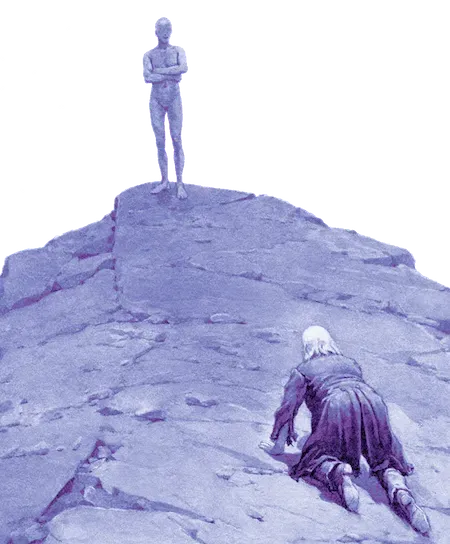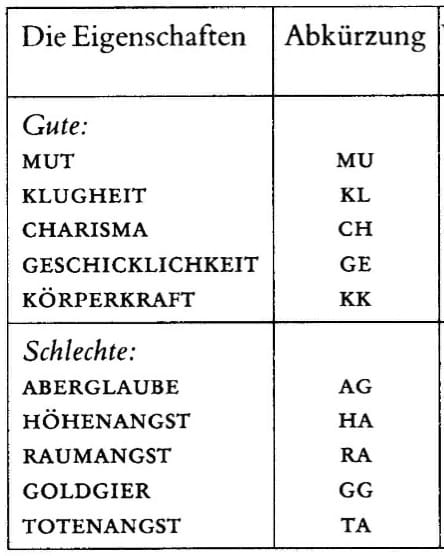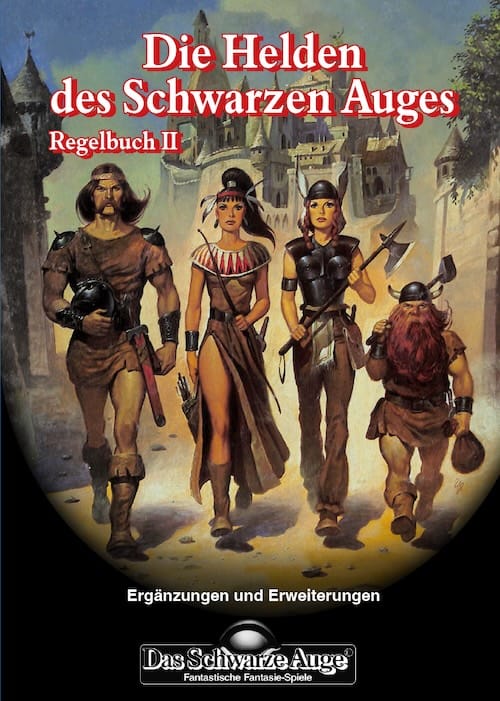
As a small side note, before I return to shoe-horning GURPS into the OSR, I want to talk about one of my favorite rules mechanics from the much-maligned German The Dark Eye RPG.
As a short historical overview, "Das Schwarze Auge" (lit. "the black eye") came out when a big German board game company banded together with some early German RPG fans and translators of English games (both D&D and Tunnels & Trolls) to create a game that would be available in the board game section of basically every German toy story.
Things had to happen fast, so it was a messy time period. One writer wanted to go in a more RuneQuest-y direction, which ended up in the "expert" rule box, whereas the basic rules hewed closer to Tunnels & Trolls. Another author didn't even like fantasy all that much, so his part of the initial adventures had plenty of pirates and even robots.
A second edition was supposed to unify all of this and the setting information. They basically reprinted the simple rules of the first edition as a thin "rule book 1" to get through the intro adventure, but as soon as you opened the second rules book from the box, you were presented with something rather unique:

The start is pretty obvious, it repeats the prime abilities the first edition already had, similar to what almost every game since D&D did:
- Courage ("Mut")
- Intelligence ("Klugheit")
- Charisma ("Charisma")
- Geschicklichkeit ("Agility")
- Körperkraft ("Strength")
Courage replaces D&D's Wisdom, and back in first edition was mostly used for determining initiative. But after this, it gets weird, there are also bad abilities:
- Superstition ("Aberglaube")
- Fear of heights; acrophobia ("Höhenangst")
- Fear of enclosed spaces; claustrophobia ("Raumangst")
- Greed ("Goldgier", lit. "greed for gold")
- Fear of corpses, tombs, etc.; necrophobia ("Totenangst")
The negative abilities had a lower starting value (1d6+1) than the positive ones (1d6+7), when you leveled up you could increase a positive and lower a negative. But other than that, they worked in a similar way: You make your check, the ability works. This is good for a Agility check, you probably crossed that chasm, but not so good for a negative one—you might stand before that chasm, afraid of the 30 foot drop.
There's one additional part of the rules, but I'll get to that later.
Knightly inspiration
Similar mechanics are common to a lot of point-buy games like HERO and GURPS, with the big difference that here a phobia is something more unique to a PC, and not everyone has them to a certain degree.
But there was also Pendragon, where every character had a list of personality traits, from Lustful to Cowardly. The big difference here is that they also had a counterpart for the low side of things (e.g. it really was Chaste-Lustful or Valorous-Cowardly). And there was more ambiguity of what side was good, which doesn't really apply to a phobia.

Save vs. Covetousness
Now let's consider the effects of these abilities. There are plenty of games where one character might have a fear of heights, which often starts at a rather crippling level. Both the gamemaster and the player of course have to remember that this is the case, or it's just a superfluous game element.
Then you often only do this for extreme effects. You can't climb the Troll Peaks, you can't squeeze through the kobold's escape tunnel.
This often means that the other players have a certain level of eye rolling or even complaints about fraidycat. This usually doesn't happen for failed ability checks or saving throws.
Now if everyone is a bit superstitious, it means that for one the gamemaster doesn't have to remember any special cases, and that everyone can fail. Lowlander Bob with his Acrophobia 7 might be a prime candidate, but Gromax, Son of Gravox, mountain dwarf and proud owner of Acrophobia 1 can also fail.
That's why I'd say this mechanic aligns more with D&D's saving throws. Everyone's susceptible to everything. No Dungeon Master ever asked if anyone's susceptible to Poison or Spells.
Good Bad Abilities
What do I like about this? I've used this a lot in play back then, probably not always in the most appropriate manner (I was so very young). I found that it workd best, when it introduced some minor setback or prompted an action. I'm all for player skill, but sometimes the people sitting around a table are just too good, and everything would run as smooth as a machine. Just making everything harder in a deadly manner or over-complicating investigations is often a step too far, small stumbling blocks make this seem more like something real humans (or humanoids) would do, not perfect agents remotely manipulated.
It also helped to engender some empathy within the group. Sure, Alphonse the Rover can rage at Bobulanthas the Elf for being to goshes-darn superstitious, but that's just going to bite him in his necrophobic back once the doors to the Crypt of the Frost Elves are opened. Better to just help your co-adventurer, maybe open up a bit about your own experiences.
And speaking of experience: You do get better at this. So your adventure-steeled level 10 heroes behave much cooler than they did when they start out. If that high ability level was tied to your background, this showed quite well how far you've moved since the start of your Hero's Journey.
Bad Bad Abilities
I've mentioned that actions being prompted were a good thing, and the opposite of course is true as well: Just blocking is boring. And the various phobias just tend to do that. So either something is impossible or you get the same "other adventurer helping out" scene all the time, encouraging a second attempt.
There's also the question of player agency. This forces players to act in a certain way, and that without any supernatural means like a hag's spell or eerie eldritch energies. One might say that not having a super-high dexterity, strength or levels in thief-acrobat prevent you from crossing the Gorge of Doom exactly like that failed acrophobia check, but in the more proactive, prompting cases, it's certainly closer to Charms or when gamemasters in some systems allow social skills to work on PCs, too. I think a lot of that depends on how it's phrased by both rules and gamemaster. If failing that Greed roll has to force an immediate action towards the desired object, it's a bit harsh and lacks nuance.
I've left out one character creation rule in the summary above, and this was one reason why there was some agency involved: Quite often players didn't have such high bad abilities just because they rolled badly, but because the game allowed you to trade between good and bad abilities. Raise a good one by a point, raise a bad one by two (or two by one, I think). So it was the player's choice, at least to a certain degree. You wanted to play an elf and had to fit those harsh ability score requirements, you had to pay somewhere.
You failed your Greed save, steal this!
Can this be used in a "traditional" OSR game, aka one of the D&Ds?
Sure. I think it would be an interesting experiment. Starting OSR characters aren't flawless heroes, and having these failings built-in would show that quite well. If there's an amount of randomness involved, it also helps you to create some quick character inspiration for those starting sessions where there's a high PC churn. That 1st level fighter that might not survive can be differentiated by the previous attempt by being a bit smarter, but also being quite superstitious.
But is randomness involved? I've mentioned a similarity to saving throws before, but those would be static. On the other hand, they would be class-based, which slots in nicely with the stereotypes associated with them. Those thieves would get a boost by all being quite low on agora- and acrophobia, well compensating for that higher greed value. Magic-users could be low on superstition, and thus better suited for some puzzles than dwarves.
If you want things more "personal", one could have a look at how moral checks work, and do it similar to that. Just like monsters in those games usually don't have a full set of abilities but do everything by their Hit Die, they also only have a vague moral value, whereas PCs have a more granular conception here. The bell curve of the 2d6 check might be seen good or bad.
Or if you're running a rule set with ability checks, roll them 2d6 down the line and treat them the same way (which probably means testing with a d20).
Now, whether you just use the abilities above is another question. They seem well suited to dungeon crawling, and thus might be more of a hindrance in a D&D game than in the more pastoral The Dark Eye adventures of that time. Again, that might actually suit the game quite well.
Later editions added negative abilities like Arrogance, Bad Temper or Curiosity. That would go in a more social direction, with interactions in cities or somewhat peaceful dungeon-dwelling humanoids could be more affected than chasms or rock walls…